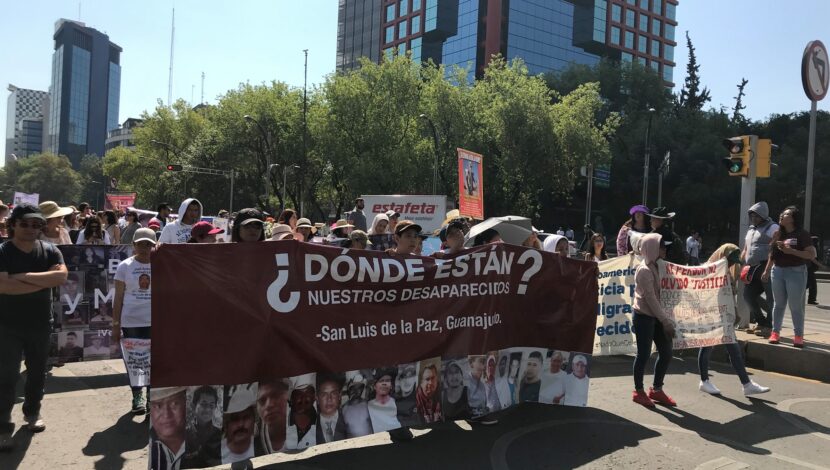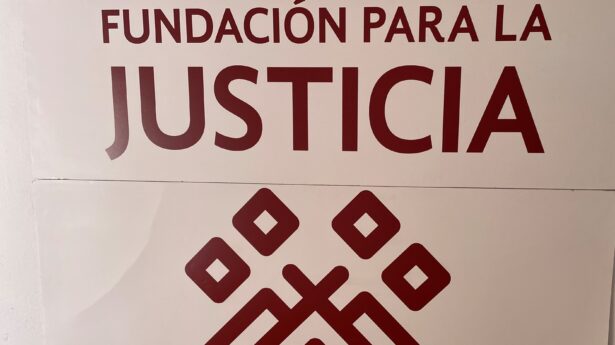The Unitarian Universalist Service Committee advances human rights through grassroots collaborations.
No Safe Transit Here

By Josh Leach on March 4, 2024
It’s one of the worst things most families can imagine: one of their loved ones goes missing, and they have no idea what may have happened to them. In February 2014, the families of 16 migrants faced this nightmare, after their relatives disappeared while making the journey through Mexico.
Their families searched for their loved ones for a full year before learning their fate. The 16 migrants—10 from Guatemala, three from Honduras, and three others who have yet to be identified—had been massacred and buried in Güémez, Tamaulipas. As reported in the Guatemalan newspaper La Hora on February 19—just after the 10-year mark since the massacre—no one to date has ever been arrested or tried for these events.
The tragic fate of these people in migration, and the impunity of their killers, is no exception in Mexico. UUSC’s partner in Mexico City, the Foundation for Justice and the Democratic Rule of Law (FJEDD) estimate that more than 100,000 people are currently missing in Mexico, an untold number of whom are migrants. In addition to accompanying the victims of the 2014 Güémez massacre, FJEDD is also working with the families of victims of similar incidents of mass violence from 2010, 2011, and 2012.
Many of these killings are linked to powerful organized crime groups that have seized control over large parts of Mexico. Migrants journeying through Mexico often have a target on their backs, because they are believed to have relatives abroad. Gangs therefore routinely kidnap migrants and asylum-seekers to extort money from their loved ones. If families can’t pay, or the migrants resist, they may be tortured or killed.
Yet, despite these well-known dangers, the U.S. government continues to enact policies that strand asylum-seekers in Mexico. To be sure, the Biden administration rightly ended Trump’s “Remain in Mexico” policy, which forced asylum-seekers to wait in Mexico during their proceedings; but a number of other current U.S. policies have a similar effect. All three of the most recent U.S. administrations have pressured the Mexican government to intercept migrants: a form of long-arm interference with asylum rights known as “border externalization.”
Similarly, the Biden administration implemented a new policy last spring that would make it much harder for many people to seek asylum, unless they first apply in Mexico and get turned down. The rule, sometimes known as the “transit ban,” has been tied up in courts since it was promulgated. A federal judge in California first blocked it, but subsequently the court of appeals for the 9th Circuit allowed it to go into effect, while they consider its legal status. The appeals court heard oral arguments in the case in November, and a decision is still pending.
The rule, if it survives legal scrutiny, would yet again strand more asylum-seekers in Mexico—despite the dangers they face there. Applying for asylum in Mexico may take years. As the U.S. District Court found, only about 35,000 asylum claims were processed in that country in 2022, compared to 118,000 new cases filed in the same period. Requiring asylum-seekers to prove that they first sought and were denied protection in Mexico, therefore, is demanding nearly the impossible. And while migrants are forced to navigate this procedural maze, they may be the victims of kidnapping, extortion, or worse.
When considering the large numbers of people seeking safety in the U.S., politicians are often tempted to ask, “Why couldn’t they just apply for asylum in Mexico, or some other country they passed through?” The fate of the 16 migrants in Güémez shows part of the answer. Even if policymakers may find it convenient to pretend otherwise, Mexico is simply not a safe country for people seeking asylum.
We can hope the “transit ban” will be struck down in the courts. We can also applaud the Biden administration for ending Title 42 and other Trump-era policies that return migrants to Mexico. But there are worrying signs that more policies along these lines may soon be coming. As of this writing, reports indicate the Biden administration is once again mulling plans to restrict asylum and expel more migrants to Mexico.
Meanwhile, both Trump and Biden toured the U.S.-Mexico border on February 29, to highlight their plans to limit asylum in a hypothetical second term. Biden condemned legislative inaction, and called on Congress and the GOP to “join” him in enacting new authority to suspend asylum when border crossings reach a certain threshold. Trump, meanwhile, invoked the language of “war” and advertised his plans for a massive campaign of detention and deportation, if he is returned to office—building on his recent extremist rhetoric likening people in migration to “poison.”
Despite real differences between the visions of the two candidates, however, they appear to agree on one thing: both are trying to keep more asylum-seekers on the other side of the border. Both are trying to prevent people in migration from leaving Mexico and reaching safety in the United States.
These policies are wrong for a simple reason. The 16 people who were murdered in Güémez deserved to complete their journey in safety, just as all people deserve to live with security and dignity. Expelling more migrants and blocking asylum will do the opposite: It will place more people in harm’s way. The U.S. government must stop trying to force asylum-seekers to stay in Mexico.
Image Credit: FJEDD

